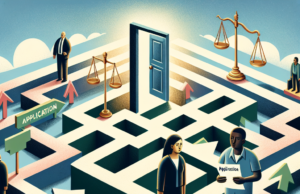- Illegal Immigration – Your Rights, Benefits, Status
- Illegal Immigration Statistics
- Illegal Immigration Facts
Rights and Benefits: An Overview
Rights are important legal, ethical, and social concepts that are designed to protect individuals and groups from undue harm or discrimination. They are considered to be essential elements of human dignity and are enshrined in human rights laws and international conventions. Rights can be classified as civil, political, economic, social, and cultural and are implemented by governments, non-governmental organizations, and individuals who seek to promote greater social justice and equality. Benefits, on the other hand, refer to the tangible or intangible forms of support or assistance that people receive from the government or other sources. Benefits are intended to help people meet their basic needs, such as food, shelter, healthcare, and education, and to improve their overall quality of life.
This article aims to examine the various types of rights and benefits available to citizens in different countries around the world. It will discuss the challenges and opportunities associated with exercising these rights and accessing benefits and will highlight the role of government in providing these vital resources.
Civil Rights
Civil rights are fundamental rights that are protected by law and are essential for individuals to participate fully in society. These rights include freedom of speech, religion, and association, and the right to a fair trial and due process. Civil rights are often enshrined in national constitutions as well as international conventions, such as the Universal Declaration of Human Rights and the International Covenant on Civil and Political Rights.
One of the most pressing civil rights issues today is the right to privacy. With the rise of technology, individuals are increasingly concerned about the protection of their personal information, especially their online data. Governments are grappling with ways to balance the need for national security with the right to privacy. In the United States, for example, the Patriot Act was passed in the aftermath of the 9/11 attacks and gave the government sweeping powers to monitor online activity and collect data on individuals without a warrant. This sparked widespread protests and legal challenges, with critics arguing that the law violated citizens’ constitutional rights to privacy. In 2015, a federal appeals court ruled that a key provision of the Patriot Act, the bulk collection of phone records, was illegal, and Congress subsequently revised the law to provide greater protections for citizens’ privacy.
In terms of meeting basic needs, civil rights related to housing and employment are critical for individuals and families. Discrimination on the basis of race, gender, religion, or sexual orientation is illegal in many countries, but disparities in housing and employment opportunities persist. In the United States, for example, African Americans and Latinos are more likely to live in poverty and experience discrimination in the job market than white Americans. The Fair Housing Act and the Civil Rights Act are two key pieces of legislation that help to protect individuals from housing and employment discrimination.
Political Rights
Political rights are the rights that enable people to participate in the political process and have a voice in government decisions. These rights include the right to vote, freedom of assembly, and the right to stand for office. Political rights are critical for ensuring that governments are accountable to the people they govern and that individuals can participate in decision-making processes that affect their lives.
One of the most important developments in recent years has been the growth of online activism and social media. Platforms like Twitter, Facebook, and Instagram have been instrumental in helping to organize protests, campaign for political change, and bring attention to important issues. Social media has also been used to document human rights abuses and to expose corruption and political repression. However, social media can also be used to spread false information and to stifle dissent, leading to concerns about the impact of social media on political rights.
In order to ensure that political rights are protected, governments must be committed to democratic principles and must be willing to allow for a free and open exchange of ideas. In many countries around the world, however, political rights are under threat. Human Rights Watch notes that over the past few years, many governments have cracked down on civil society organizations, journalists, and opposition political parties. These efforts to limit political rights have taken many forms, including the passage of restrictive laws, the arrest and detention of activists, and the harassment of journalists and members of opposition political parties.
Economic Rights
Economic rights are those rights that are related to people’s ability to participate in the economy and to access the resources they need to live a decent life. These rights include the right to work, the right to a fair wage, and the right to social security and assistance. Economic rights are vital for ensuring that people are able to meet their basic needs and to participate fully in society.
One of the most pressing economic rights issues today is income inequality. In many countries around the world, the gap between the rich and the poor has widened, leading to concerns about social cohesion and political stability. The United Nations notes that income inequality is a major obstacle to reducing poverty and achieving sustainable development. Governments can help to address income inequality by implementing progressive tax policies, investing in education and job training programs, and providing social safety nets for those who are most vulnerable.
Challenges related to economic rights can also be particularly acute for marginalized communities, such as ethnic and racial minorities and women. In many countries, these groups face discrimination in the job market and are disproportionately affected by poverty and unemployment. Addressing economic inequality requires not only policies that are designed to support marginalized communities but also broader structural changes in the economy and in social institutions.
Social Rights
Social rights are those rights that are related to people’s ability to access essential services and resources, such as healthcare, education, and housing. These rights are critical for ensuring that all people have the opportunity to lead healthy and fulfilling lives and to participate fully in society. In many countries around the world, access to essential services is uneven, with marginalized communities often being excluded from high-quality services.
One of the most pressing social rights issues today is access to healthcare. In many countries, access to healthcare is a major obstacle for people who are poor or live in rural areas. The World Health Organization notes that approximately half of the world’s population lacks access to essential health services, and many people who do have access to healthcare face significant financial barriers to receiving the care they need. Governments can help to address healthcare disparities by investing in healthcare infrastructure, expanding access to health insurance, and increasing funding for healthcare research and development.
Education is another critical social right. Education is not only important for individual success but also for social and economic development. In many countries, however, access to education is uneven, with marginalized communities often being excluded from high-quality educational opportunities. Furthermore, education systems can sometimes perpetuate inequality, with students from disadvantaged backgrounds facing economic, social, and cultural barriers to success. Governments can help to address these issues by investing in education infrastructure, increasing funding for education programs, and promoting policies that are designed to support marginalized communities.
Cultural Rights
Cultural rights are those rights that are related to people’s ability to practice their culture and to access cultural resources, such as museums, libraries, and sacred sites. These rights are essential for ensuring that people are able to maintain their cultural traditions and to participate fully in cultural life. In many countries, however, cultural rights are under threat, with marginalized communities facing discrimination and exclusion from cultural institutions.
One of the most pressing cultural rights issues today is the preservation of cultural heritage sites. Many cultural heritage sites are under threat due to conflict, climate change, development projects, and other factors. Protecting cultural heritage sites is essential for preserving cultural diversity and promoting understanding and respect among different cultures.
Another cultural rights issue is language rights. Many people around the world speak minority languages that are not recognized or supported by the government. This can lead to linguistic discrimination and exclusion from important social and economic opportunities. Governments can help to address language rights issues by promoting the use of minority languages in education and public life and by investing in language preservation programs.
Conclusion
Rights and benefits are essential components of social justice and equality. The rights and benefits that people receive from the government and other sources help to ensure that they are able to meet their basic needs and to participate fully in society. Challenges related to rights and benefits are complex and require ongoing attention and investment. Governments, non-governmental organizations, and individuals can all play a role in promoting greater social justice and equality. By working together, we can help to build more equitable and just societies that are grounded in the principles of human dignity and respect for all.


















